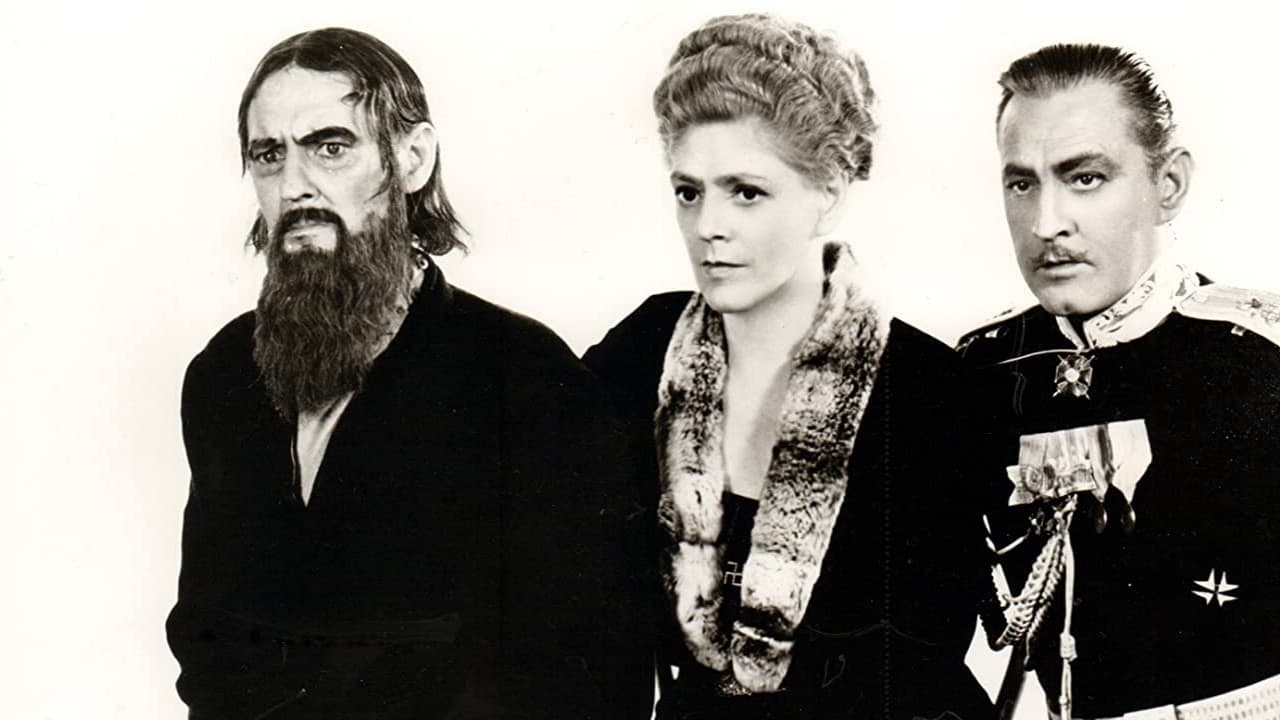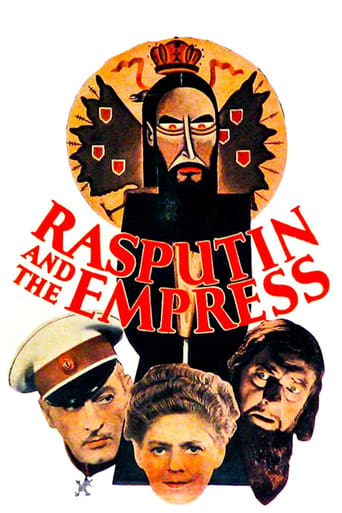

I am only giving this movie a 1 for the great cast, though I can't imagine what any of them were thinking. This movie was horrible
... View MoreIf you're interested in the topic at hand, you should just watch it and judge yourself because the reviews have gone very biased by people that didn't even watch it and just hate (or love) the creator. I liked it, it was well written, narrated, and directed and it was about a topic that interests me.
... View MoreThis is a dark and sometimes deeply uncomfortable drama
... View MoreActress is magnificent and exudes a hypnotic screen presence in this affecting drama.
... View MoreWow - a chance to see the three Barrymores together.Kind of underwhelming."Rasputin and the Empress" is the amazingly inaccurate story of Rasputin and his influence on the royal family. Lionel is the man himself, John is the man who wants him dead, Prince Chegodieff, and Ethel is the Empress.This film cost MGM a lot of money in lawsuits even though the names were changed to protect the guilty. The Yusupov family made quite a bit of money thanks to their portrayal in this film, as Prince Chegodieff and Natasha.The movie doesn't hold up for reasons beyond its plot. Ethel, who was very good as a character actress in films, here does the sort of acting popular in the day, melodramatic and with a quivering voice. She just may not have been used to film acting, I don't know.Lionel played Rasputin and he was good, except that his Rasputin is apparently a rapist as well as a madman. And John, my favorite, is wasted. He really should have played Rasputin, and this film would have gone up a level or two.At any rate, seeing the three Barrymores together was a big bust. Also, John and Lionel didn't get along at least at that point, and while on the set, Lionel called the director from a pay phone and told him to tell John to stop touching him. John would put his hand on Lionel's arm in a scene, which was a way of drawing the focus to John.One big happy family. Skip it.
... View MoreRasputin and the Empress shouldn't be used as a lesson of pre-Soviet Russia. Names have been changed (and that didn't prevent MGM from law suits) and a lot of the information we now know about this period of Russian history - was not known in 1932.As other people have commented about this being the only film that Ethel, John, and Lionel Barrymore appeared together, this movie doesn't show why the Barrymores have the reputation that they have. John Barrymore's career started going downhill after the introduction of sound. Lionel Barrymore, wearing one of the phoniest fake beards, tries to capture the charisma and sense of control that Rasputin had over Czarina Alexandra and the Czarevitch. Ethel Barrymore gives an understated performance - too understated at times. When her only son seems to be close to possible death, she doesn't seem all that bothered.C. Henry Gordon is a great Grand Duke Igor, Ralph Morgan is a convincing Czar Nicholas II, but they don't appear that frequently. Don't expect anyone to speak with a Russian accent or even attempting and accent.Rasputin is one of the most interesting people in the world during the early 20th Century. He was also one of the most enigmatic and contradictory. A holy man who was accused of raping a nun, excessive drinking, and being power hungry. Barrymore's portrayal of Rasputin plays this up, plus making claims that he will be Russia. He seems almost like Charles Manson at times in the way he can make someone, especially the Czarevitch, behave like they are totally different people compared to the way they acted before meeting Rasputin.It is best to watch this movie as just that - a fictional representation of various accounts of what happened in the royal court of Russia in its final days. The writers included Charles MacArthur, Ben Hecht, Robert Sherwood, Mercedes de Acosta, and Lenore Coffee - some of the best writers of the period.It's worth a view - don't expect historical accuracy, but it is an interesting film that tries to show a much different world than what Americans would have known.
... View MoreWatch 1971's "Nicholas and Alexandra", watch the cable TV movie with Alan Rickman as Rasputin, watch the silent film about the last Czar--Don't watch this clunker. Far and away the worse film on the fall of the Romanov Royal dynasty that I've ever seen. Bad acting--Poor choices for Alexis and Alexandra. The portrayal of Rasputin -- yeah, right--- if he had reached 70 and his voice was....Who could relax listening to a sinister warlock stirring a pot????? That's what he sounded like to me. I've seen drunk, lecherous Rasputins, I've seen charlatan Rasputins but never one that "mad scientists" creep-ed me out. Nicholas, the most watchable actor of all in this atrocity, is hardly seen on screen.Gross, gross re-write of history on several key points and by the film's end I wanted to burn all the copies of this film because of "Prince Paul" and his gal pal....OH, the horror, the horror.The death scenes both of Rasputin and Nicholas and his family is beyond bad.
... View MoreThis is a reasonably decent movie, well acted (particularly by Lionel, who practically chews the scenery as Rasputin) and the sets and costumes are fairly nice. But the main selling point is that this is the only time the three Barrymores -Ethel, John and Lionel did a movie together. It's a good movie but could have been much better.
... View More